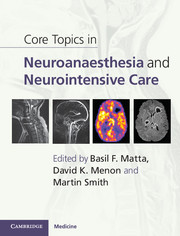Book contents
- Core Topics in Neuroanaesthesia and Neurointensive Care
- Core Topics in Neuroanaesthesia and Neurointensive Care
- Copyright page
- Contents
- Contributors
- Preface
- Acknowledgements
- Section 1 Applied clinical physiology and pharmacology
- Section 2 Monitoring and imaging
- Section 3 Neuroanaesthesia
- Section 4 Neurointensive care
- 18 Overview of neurointensive care
- 19 Systemic complications of neurological disease
- 20 Post-operative care of neurosurgical patients
- 21 Traumatic brain injury
- 22 Management of aneurysmal subarachnoid haemorrhage in the neurointensive care unit
- 23 Intracerebral haemorrhage
- 24 Spinal cord injury
- 25 Occlusive cerebrovascular disease
- 26 Neuromuscular disorders
- 27 Seizures
- 28 Central nervous system infections and inflammation
- 29 Intensive care of cardiac arrest survivors
- 30 Death and organ donation in neurocritical care
- 31 Ethical and legal issues
- 32 Assessment and management of coma
- Index
- Plates - PDF Only
31 - Ethical and legal issues
from Section 4 - Neurointensive care
Published online by Cambridge University Press: 05 December 2011
- Core Topics in Neuroanaesthesia and Neurointensive Care
- Core Topics in Neuroanaesthesia and Neurointensive Care
- Copyright page
- Contents
- Contributors
- Preface
- Acknowledgements
- Section 1 Applied clinical physiology and pharmacology
- Section 2 Monitoring and imaging
- Section 3 Neuroanaesthesia
- Section 4 Neurointensive care
- 18 Overview of neurointensive care
- 19 Systemic complications of neurological disease
- 20 Post-operative care of neurosurgical patients
- 21 Traumatic brain injury
- 22 Management of aneurysmal subarachnoid haemorrhage in the neurointensive care unit
- 23 Intracerebral haemorrhage
- 24 Spinal cord injury
- 25 Occlusive cerebrovascular disease
- 26 Neuromuscular disorders
- 27 Seizures
- 28 Central nervous system infections and inflammation
- 29 Intensive care of cardiac arrest survivors
- 30 Death and organ donation in neurocritical care
- 31 Ethical and legal issues
- 32 Assessment and management of coma
- Index
- Plates - PDF Only
Summary
Keywords
- Type
- Chapter
- Information
- Core Topics in Neuroanaesthesia and Neurointensive Care , pp. 475 - 487Publisher: Cambridge University PressPrint publication year: 2011



